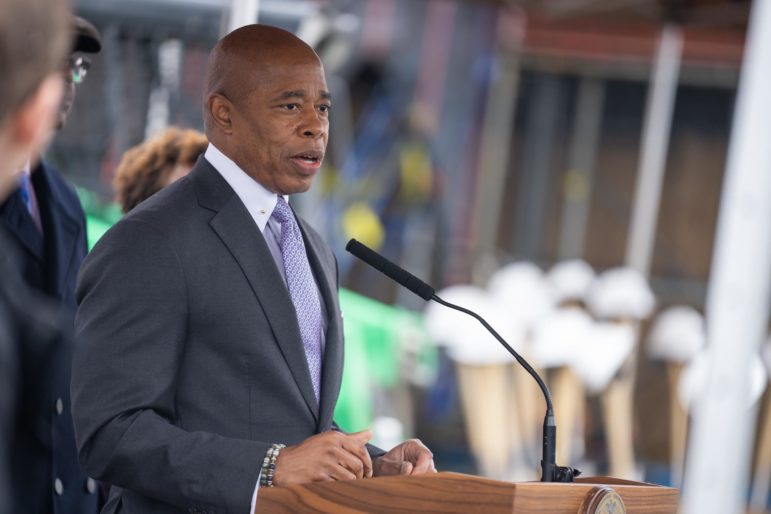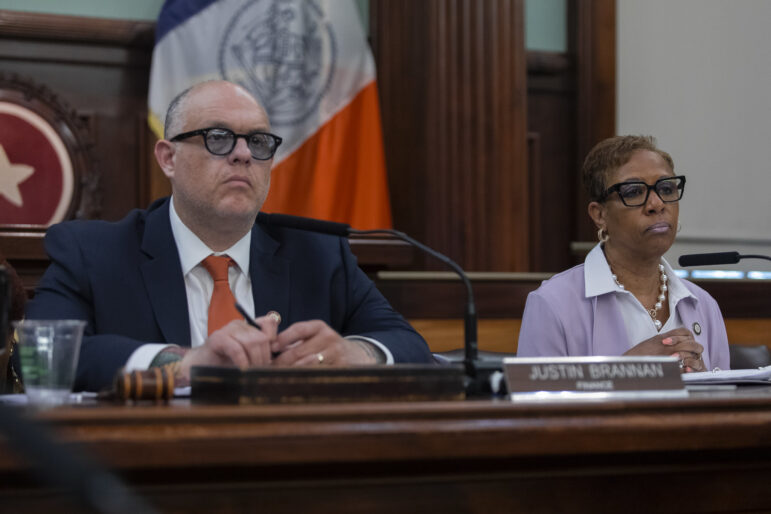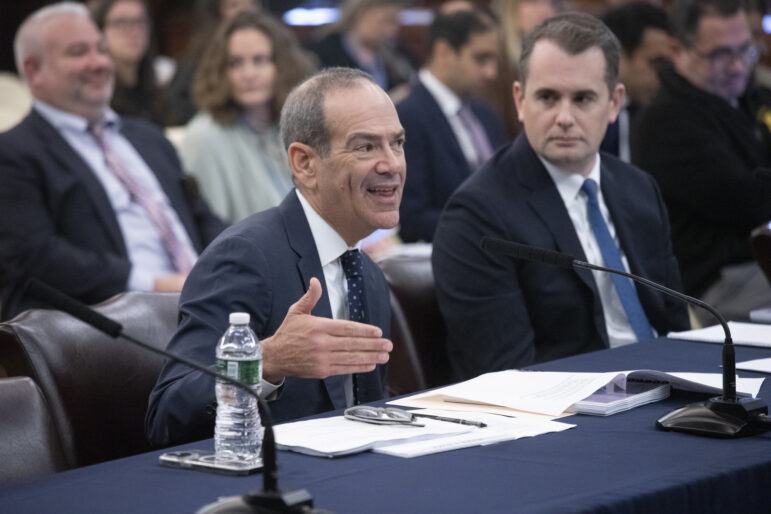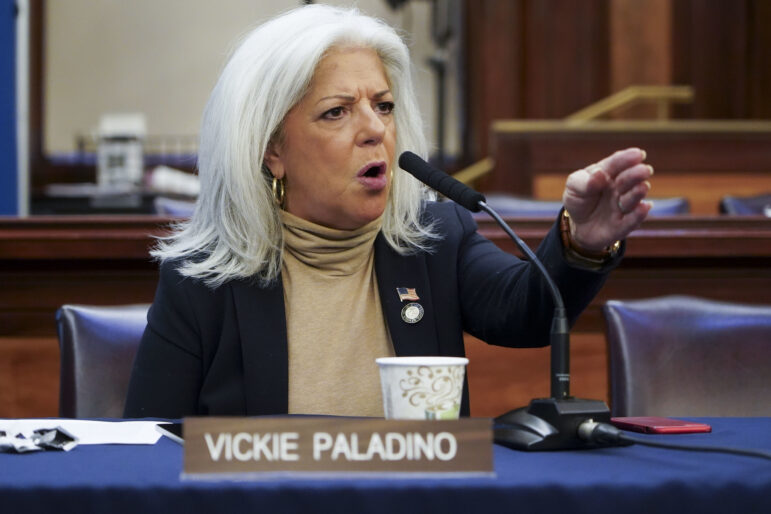“As mayor, Adams now wields more power and influence than ever before, and for this reason, his pro-respectability mindset is a serious cause for concern.“

Ed Reed/Mayoral Photography Office
Mayor Eric Adams at a press conference in early April.Just over three months in office, and New York City Mayor Eric Adams has already drawn major backlash on a number of issues pertaining to the Black community. Before he was even sworn in, he vowed to “bring back” solitary confinement at Rikers Island, a notoriously torturous detention complex where more than half of the inmate population is Black. Then last month, he publicly denounced drill rap, an increasingly popular style of hip-hop that is currently dominated by the New York scene.
While Adams is far from the first New York mayor to hold controversial stances on issues that disproportionately impact Black people, there is something particularly frustrating about hearing this kind of rhetoric from him. Adams is only the second Black person in history to hold mayoral office in New York City. He is a New York native, born in Brooklyn and raised in Queens in the 1960s. In his teenage years, he was a member of a gang, and was even brutalized by police during a stint in a juvenile detention facility. And yet, he still seems so out of touch. How is it that a Black man with a criminal history could promote the torture of those incarcerated at Rikers Island? How could a man raised in the city that birthed hip-hop speak with such denigration about modern-day rap?
The issue here is not one of a lack of understanding—Adams certainly does not need a handbook on the plight of Black people in America. He understands, from personal experience, how Black communities have been ravaged by economic disenfranchisement, over policing and mass incarceration. However, to Adams, racism and systemic injustice are not the only reasons that Black people are so overwhelmingly disadvantaged. In fact, he has a long history of promoting the idea that Black people have made their already deprived condition worse by upholding negative stereotypes and failing to conform to the standards of white society. The real issue is that Adams is the unofficial spokesperson for respectability politics.
Adams’ overall message to the city is that Black people must shoulder the responsibility of alleviating racism by fine-tuning their behavior to the satisfaction of white people. This presumption, however, is not only dishonest, but harmful.
Respectability politics is the belief that the liberation of oppressed groups is most possible through assimilating to dominant standards and norms. The term was first used in 1993 by African-American studies professor Evelyn Brooks Higgenbotham. She coined the term in her book “Righteous Discontent,” which tells the story of the Women’s Convention, an organization of Black Baptist women who used the church as a vehicle to affect social change and racial progress at the turn of the 20th century. Higgenbotham describes how the Women’s Convention emphasized the importance of using manners and morals to disprove racist notions about the sexual promiscuity of Black women and the biological inferiority of the Black race. They were highly critical of Black people who did not exhibit so-called respectable behavior, and even distributed literature in Black communities with titles such as “Take a Bath First,” “How to Dress,” and “Ten Things the Negro Needs.”
Respectability politics remains a pervasive ideology amongst Black leaders to this day, as evidenced by Adams’s life and career. Despite the adversity he faced as a young adult, Adams transformed the trajectory of his life and set out on a much more respectable path. He served as an NYPD officer for 22 years, retiring as a captain. During his time as an officer, Adams became acutely aware that Black men were often immediately perceived as criminals by the police. Not only did he find himself misjudging young Black men, but he was once even mistaken for a suspect by fellow police while on duty in plainclothes. This inspired him to advocate for initiatives to hire more Black and Latino police officers. Adams recognized the need for change within the police department, however, he believed that behavioral change within the Black community was equally important, and much like the Women’s Convention, he set out on a mission to spread this message.
In 1995, Adams founded an organization of Black police officers called 100 Blacks in Law Enforcement. The group visited churches and youth groups to teach Black people how to avoid violent encounters with police. They advised extreme caution: keep your hands visible at all times, don’t reach for anything without announcing it to the officer first, and even if a white officer is being blatantly racist, “ignore it and de-escalate the situation.” Essentially, the group encouraged Black people to combat racist policing by presenting themselves in a non-threatening, so-called respectable manner.
Once he retired from the police force and ventured into politics, Adams ramped up his efforts to promote respectability. In fact, perhaps his most blatant demonstration of respectability politics occurred during his time in the New York Senate. In 2010, then Senator Adams launched the “Stop the Sag” campaign to discourage Black men from sagging their pants below the waist. Adams argued that sagging was an unacceptable manner of dress that perpetuated negative images and stereotypes of Black culture.
“…In this country, images of ridicule, portraying certain groups in a negative way, have been forced on minorities…. It is disturbing that today, we still see similarly negative and degrading imagery, but this time, it is self-imposed,” Adams said in a video released to promote the campaign.
To really make his point, he installed billboards in Brooklyn featuring a massive image of young Black men sagging. The text read: “We are better than this!” and “Raise your pants, raise your image!” In this instance, Adams takes respectability politics to the extreme. Sure, the Women’s Convention handed out literature on “How to Dress,” but Adams’ made a public display, almost as if he hoped to embarrass or humiliate Black men who sag.
Black people who present themselves as “respectable” are not immune to experiencing racism, as Adams himself can attest, and Black people who do not conform to white standards, whether they cannot or choose not to, are no more deserving of ridicule and mistreatment. If it is a system of racism that causes Black people to be targeted by police, then it is the system that must change. If it is our society that projects racist stereotypes onto Black men, then it is our society that must change.
For those who promote respectability politics, demanding a system that respects the humanity of all Black people, regardless of how they present themselves, is simply unrealistic. In defense of respectability, Harvard professor Randall Kennedy argues in Harper’s Magazine that “the support or at least the acceptance of many whites is necessary to enact policies that will bring about substantial positive change.”
And while it is true that support from white and other non-Black allies can help advance the cause of racial justice, this support should never be contingent on anything other than the fundamental right of every human being to be treated justly.
As mayor, Adams now wields more power and influence than ever before, and for this reason, his pro-respectability mindset is a serious cause for concern. Activists, community organizers and local government leaders have worked tirelessly for decades to advance criminal justice reform in New York City, and over the past few years, a number of these efforts, like bail reform and a plan for the permanent closure of Rikers Island, have reached the legislature. Three months in office, and Adams has already begun to push back on this trend toward reform by pledging to reverse bail reform laws and bring back methods of combating crime that have been proven to impact Black people negatively and disproportionately, such as solitary confinement and the stop-and-frisk unit of the NYPD. Perhaps Adams believes that the racist repercussions of cracking down on crime are warranted, as the Black people who are most likely to be impacted do not fit into his mold of respectability.
When asked in December about critics of his views on solitary confinement, he said to NBC 4: “I’m going to ignore them… if they like it or not, I’m the mayor.” Hopefully he does not continue to lead the city with such disregard for his constituents’ opinions. If he does, he will miss the opportunity to improve the lives of every Black New Yorker, whether or not they sag their pants, through lasting, structural change.
Rosalyn Huff is a criminal defense paralegal based in New York City.









6 thoughts on “Opinion: Eric Adams’ History of Respectability Politics is Holding Him Back as Mayor”
I applaud Mayor Adams. This knowledgeable author understands the dynamic clearly, and has told Adams’ narrative arc to then principles he’s relied on in his path to becoming the Mayor, but reaches the absolute wrong conclusions on what is to be learned from this in my opinion.
Respectability politics represents an enlightened path to achieving the desired and needed outcomes. This author suggests that the path isn’t appropriate because it’s not her preferred path.
I’m business, in the city, in the world, adeptly navigating circumstances and understanding the nuances that drive parties apart and working to meet half way, or more in some instances, to achieve objectives happens all the time. Why is this different when it comes to how those of color, me included, seek to achieve an outcome.
The underlying message of this piece is what hurts those it portends to represent.
Thanks for the thought provoking piece, and. Huff. And…Kudos, Mayor Adams
This is an excellent article. This is, in my opinion, one of the best posts ever written. Your work is excellent and inspiring. Thank you very much.
I really applaud the Mayor too! It’s nice to let the Black Elites in higher education “create” fancy terms from their Ivory Tower, but Mr. Mayor is coming up with practical solutions to our problems. From the phrase “Respectability Politics” to “Critical Race Theory” Black Elitists from Georgetown in the former to Harvard in the latter sit around and come up with silly ideas while our children are being killed, our communities are being ravaged by drugs, etc. I hope the Mayor continues to do his job in the way he is doing it. And for the record I’m an African American Man.
I always associate Mayor Adams, with a communications posture that evokes the 70s movie character “Shaft” remade by Samuel Jackson! Would you say “Shaft” was also about “respectability politics” in his approach? Anyone care to explore this theme? I find the “shaft” act a bit tired now, on Adams. I wonder if the public sees this too?
To confirm, you have a problem with teaching kids how to safely interact with police? Or with the mayor having been part of said group?
Kids, the author is an idiot. Please understand that life is full of indignities. If a police officer stops you, even if for no reason, always be polite and don’t reach for anything without communicating to the officer. I also recommend asking to call a parent as I feel most an officer is less likely to violate your civil rights if he knows you have somebody at home who cares about you.
This article is clickbait. You should be ashamed.
Sagging pants came from part of prison culture.
Black people negatively and disproportionately, such as solitary confinement and the stop-and-frisk unit of the NYPD.
Also, am I correct in reading that you believe ending solitary confinement on Rikers will improve the lives of every Black New Yorker?
To be clear, you’re saying it was bad for Eric Adams and other police officers to teach children how to safely interact with police?